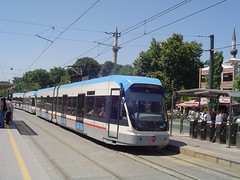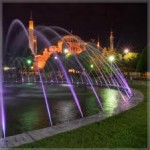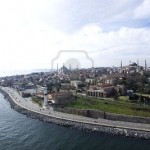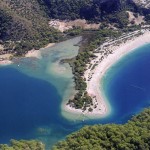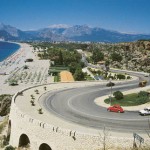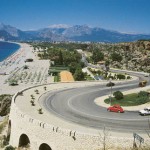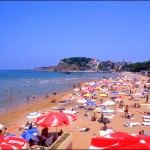Moving to Turkey
 Turkey’s geographical location, which features the only city to straddle two continents, Istanbul, has made it an ideal destination for living and doing business for centuries. Connecting two continents by a body of water known as the Bosphorus, Turkey is home to many ethnic backgrounds, religions and cultures. With the great cultural treasure that holds artifacts, traditions and literature, Turkey is a melting pot of many cultures and peoples. Due to its colorful and long history, this beautiful country is also a mix of old and new, eastern and western, worlds.
Turkey’s geographical location, which features the only city to straddle two continents, Istanbul, has made it an ideal destination for living and doing business for centuries. Connecting two continents by a body of water known as the Bosphorus, Turkey is home to many ethnic backgrounds, religions and cultures. With the great cultural treasure that holds artifacts, traditions and literature, Turkey is a melting pot of many cultures and peoples. Due to its colorful and long history, this beautiful country is also a mix of old and new, eastern and western, worlds.
Culture and Customs
Modern day Turkish culture and customs are derived from European, Middle Eastern, Mediterranean, Slavic and Asian heritages, making it truly diverse. The three major religions of the world are also to be found within the culture, each claiming historical beginnings in the region. Other major ethnic groups include the Albanians, Arabs, Assyrians, Bosniaks, Circassians, Kurds, Laz and the three officially recognized minorities, i.e. the Armenians, Greeks and Jews. After the fall of the Ottoman Empire, Mustafa Kemal Atatürk created what is now known as modern day Turkey; one of his primary goals was to make it a progressive, secular, unified state, which helps to illuminate Turkey’s western-leaning foundations.
Religion
Turkey is 99% Muslim despite being a secular state; the remainder of the population consists of Christians and Jews.
Language
Turkish has been the sole official language of Turkey since the founding of the Republic in 1923.
States and Territories
Turkey consists of seven regions: the Black Sea Region, the Marmara Region, Aegean, Mediterranean, Central Anatolian, the East and Southeast Anatolian. Turkey has three major coastlines (Black Sea to the north, Mediterranean to the South and Aegean to the west).
Education
Education is compulsory for ages 6-15 during primary school years. High schools are either 3 or 4 years long and students can choose from either public or private. The majority of Turkish adolescents attend public schools. Public schooling is free and users pay fees for private schooling. University entrance in Turkey is based on a national exam, the OSS, which allows you to attend Turkish universities based on the score received. The literacy rate is 95.3% for men and 79.6% for women.
Family Life
Family is a cherished aspect of Turkish culture. Family ties here are strong, and extend far past the immediate members. Within recent years, younger generations are becoming more independent of their families and are establishing their own reputation and financial income. In rural areas, extended families tend to live together; a household might very naturally consist of parents, children, and grandparents and perhaps even aunts or uncles. Urban families mostly consist of parents and children and maybe grandparents. Because family life is so important here, children rarely move out unless they are married, even when/if they do, they still remain firmly connected and in frequent contact. Additionally, retirement homes are unheard of as their children almost always look after the elderly.
Health
One of the most significant developments in the health care sector in Turkey recently has been the specialization of hospitals by branch, which has led to higher performance rates overall. Some of the most impressive hospitals include the Dünya Göz Hastanesi, which specializes in eye care, Acibadem Saglik Group’s Kozyatagi Acibadem Hastanesi, which specializes in neurology and oncology, and the Anadolu Saglik Merkezi, which focuses on oncology and was opened after an 80 million dollar investment. These hospitals are part of a collective with some of America’s most important medical schools including Harvard Medical and John Hopkins Medical Schools.
These investments have greatly increased the number of patients coming from abroad to receive treatment within Turkey, as well as having elevated the status of the health sector in Turkey significantly. For example, Turkey’s thermal hot springs are very popular and both locals and tourists enjoy the benefits of these natural wonders. In addition to the thermal hot springs, some of the most in demand treatments include organ transplantation, heart and eye surgeries, hair transplants and plastic surgery. Of the European and Middle Eastern countries, Danes, Norwegians and Swedes travel to Turkey in the largest numbers for treatments. Of the 100 billion dollars that will have been made in the health sector in the world, it is predicted that 10 billion dollars will belong to Turkey within the next 5 years.
The Turkish real estate sector, which experienced a surge in 2005, in Istanbul in particular, went through a golden age in the first half of 2008. Turkish real estate made significant developments in the city centre areas dominated by offices; in particular, in Istanbul, the area ranging from Barbaros Bulvari through Büyükdere Caddesi all the way to Maslak went through a major transformation during the golden years from 2005-2008. Many rented buildings and signed contracts even before the construction was done, thus elevating the status of the area and increasing the demand for even more buildings and in turn the prices as well.
Many international real estate companies are hoping to take advantage of the global economic crisis by significantly decreasing prices for real estate projects and thus filling a void in the market, by providing housing at more affordable prices.
Under the supervision of US company Pricewaterhouse- Coopers (PwC), The Urban Land Institute (ULI) prepared a ‘European Real Estate Sector New Trends Report’, earning Turkey the spotlight in 2006 for being the number one country to invest in. What made Turkey an attractive place for real estate investment were a number of things including the tourism sector’s potential, indicating the country’s need for more hotels as the report had stated. The report also stated that Istanbul and Izmir were among the most favorable cities to invest in, also due to a rise in their tourism sectors.
Recreation
Recreation in Turkey tends to reflect the slower pace of European life. People of all ages enjoy meeting with friends and drinking tea, perhaps also while playing the very popular backgammon. Football (soccer) is the most popular sport in Turkey and much time is spent watching, playing and discussing. The three most popular teams are Galatasaray, Fenerbahçe and Besiktas. Turkish people are very fond of the sun and everything that goes with it; the warmer months are spent outdoors or on the beach. Turkish people also love to dance and enjoy music, thus it is not out of the ordinary for a dinner party to turn into a dance party or sing-along. Turkey also has many impressive museums and the locals love to support the arts. Istanbul, for example, has the popular and impressive Istanbul Modern Art Museum, Sabanci Museum and Santralistanbul, just to name a few.
Transport
Though taxis are popular and inexpensive in urban areas, travelling throughout the country is usually done by bus. Traveling by water is another efficient option within the city and is popular in Istanbul and Izmir. One of the most exciting projects of late is the subway system, which is being worked on and developed. The aim is for the subway system to eventually be as impressive as that of any other European city. Istanbul has also been enjoying the addition of the Metrobus, which runs from Levent to the Airport; it is fast, inexpensive and easy. The best part about it? It has it’s own lane on the freeway, thus bypassing traffic completely.
Work
Everyone has the right to work in Turkey if they have the right documentation and work permit. How quickly you can find a job in Turkey depends on economic factors, qualifications and skills, the type of work you are seeking, and particular circumstances that may affect the availability of certain types of work in different parts of the country. The government sets laws on wages and work conditions. The laws are about the types of legal agreements that define the work relationship between employers and employees. The agreements determine the amount paid to an employee, the hours worked and conditions such as safety, leave, allowances, training, anti discrimination and more. However, within private institutions working agreements are made between employer and employee directly. If you do not already have a source of income or a job available, and provided your visa allows it, you will need to look for work.
See Original Article
Related Articles:
Turkey
Jordan
Egypt
Greece
Spain
Geography of Europe
Geography of Asia
More Articles about Investing in Turkey

